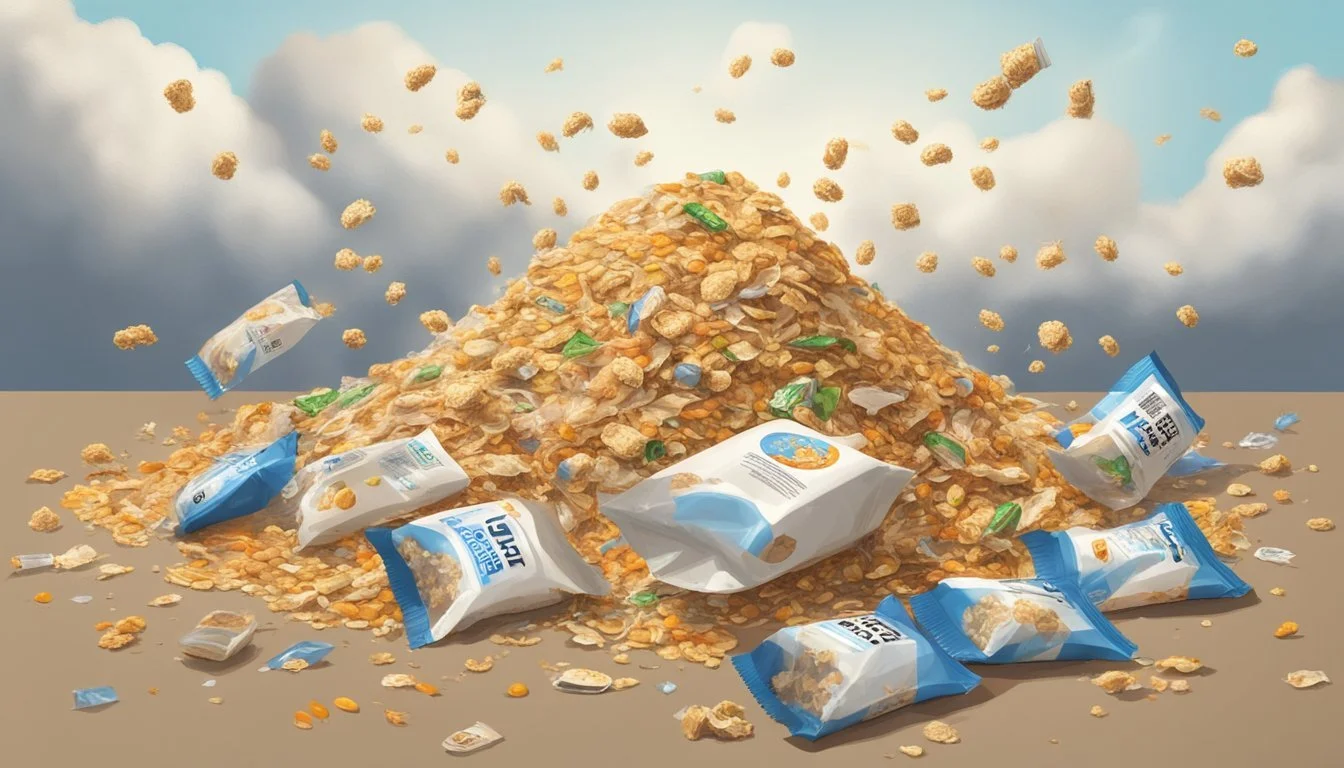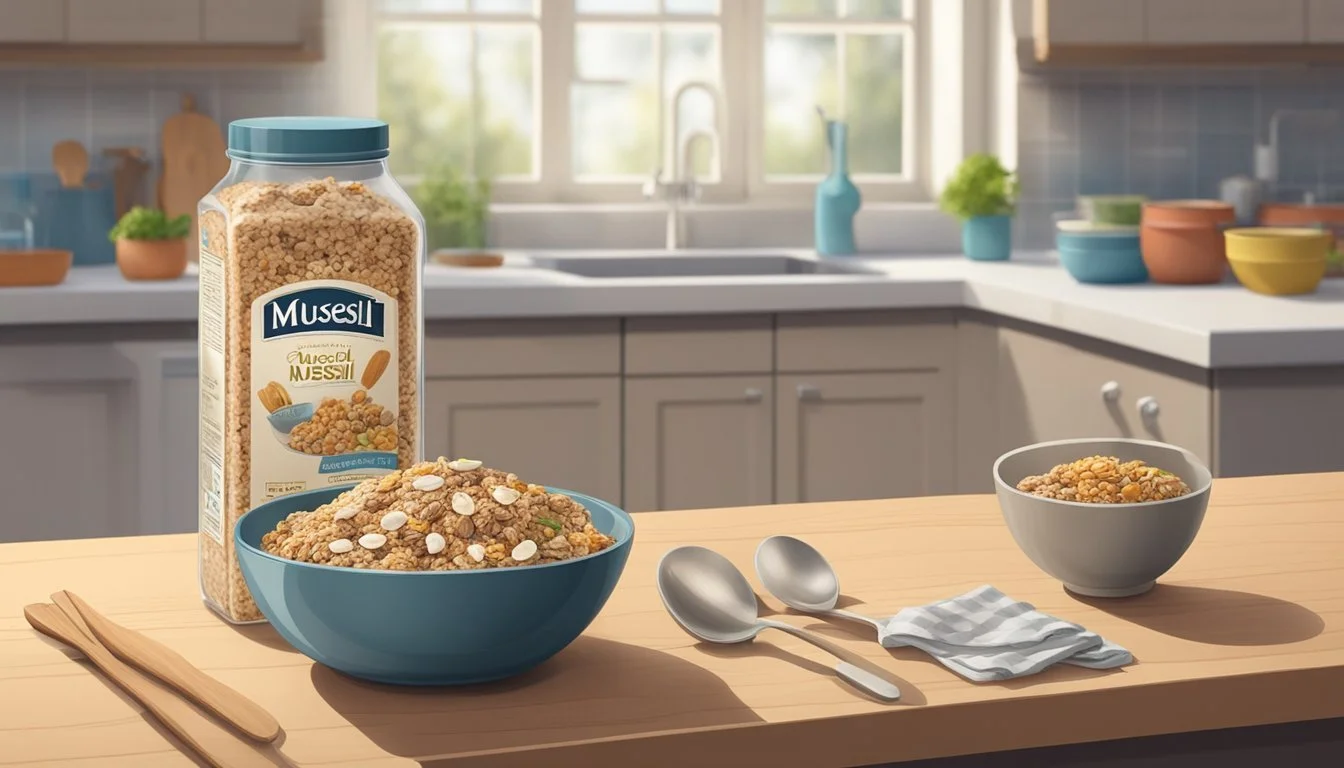Is it Safe to Eat Expired Muesli?
Understanding Food Expiry Guidelines
Muesli, a popular breakfast cereal, is a mix of oats, nuts, seeds, and dried fruit known for its health benefits and ability to keep one satiated. However, consumers often find themselves questioning the safety of consuming muesli past its expiration date. It's important to distinguish between 'best before' dates, which refer to quality, and 'use by' dates, which are about safety. Muesli typically comes with a 'best before' date and, while it may be safe to eat after this date, its quality and nutritional value could degrade.
Safety is a key concern when it comes to eating expired foods, and muesli is no exception. The growth of harmful bacteria or toxins, such as those from the Salmonella species, can occur in foods that have been kept too long and may lead to foodborne illnesses. Symptoms commonly include diarrhea, fever, and abdominal cramps. These risks underscore the need for proper storage and regular checks on muesli's organoleptic qualities—its smell, taste, and texture—before consumption.
It's generally agreed that temperature affects the longevity of food products, and muesli is susceptible to this as well. Cooler temperatures tend to preserve food longer, so storing muesli in a cool, dry place can extend its viability beyond the stated expiration date. However, consumers should remain mindful that once muesli exhibits changes in its expected taste, texture, or smell, it may be best to err on the side of caution and avoid consumption.
Understanding Food Labels
When purchasing packaged foods like muesli, the labels present information that can guide consumers on the product's optimal consumption period and food safety. Specifically, 'Best Before' and 'Expiration' dates are crucial indicators of quality and shelf life that consumers should understand.
Decoding 'Best Before' and 'Expiration' Dates
Best Before Date: This date indicates the period during which the product is considered to be at its optimal quality in terms of taste and nutritional value. It is not a safety date. For muesli, the presence of ingredients like nuts and oats may affect the taste and quality past this date, but it generally remains safe to consume if there are no signs of spoilage.
Expiration Date: This date is more critical from a food safety perspective. It is commonly found on products where food safety is an imperative concern after the indicated date, like meats and dairy. Consuming products past their expiration date can pose health risks. However, this type of date is less commonly associated with non-perishable foods like muesli, as they have a longer shelf life and the primary concern post-date is quality, not safety.
Indicator Relevance Concern Example Best Before Date Quality after this may decline Taste, Nutritional Value Muesli Expiration Date Safety could be compromised after this Health Risks Dairy Products
Food Safety Standards and Regulations
Each country has its own regulations in place to ensure the food safety of its consumers. For instance, in the United States, food expiration labels are determined by the manufacturers and may not be consistent across products. However, food safety is central to these standards, and they require manufacturers to provide a date by which they guarantee the quality and safety of their foods. This helps consumers determine the period in which they should consume a product for the best experience.
Quality: Focuses on the sensory aspects such as texture and flavor. For muesli, quality might decrease due to the oxidation of fats and oils, affecting taste and texture.
Shelf Life: Defined by both best before and expiration dates to help consumers judge how long the product can be stored before the quality diminishes or safety becomes a concern.
Consumers should understand these labels to make informed decisions about the safety and quality of the foods they eat, including muesli. While best before dates can be viewed as a guideline for optimal freshness, expiration dates should be adhered to strictly, particularly for perishable items where safety is a concern.
Factors Influencing Muesli Shelf Life
The shelf life of muesli depends greatly on factors such as packaging and ingredient quality. How it is stored and the type of ingredients used can either extend or reduce its freshness duration.
Packaging and Sealed Containers
Packaging plays a critical role in retaining the quality of muesli. Manufacturers often use sealed containers that limit exposure to air and moisture, which are primary culprits in degrading the product. A sealed container provides a barrier against environmental contaminants and pests, thus preserving the muesli's shelf life.
Advantages of Sealing:
Reduces oxidation of fats and oils
Prevents the growth of mold and bacteria
Effects of Ingredients on Freshness
The ingredients in muesli directly affect its freshness and longevity. Whole grains, nuts, and dried fruits each have varying expiration dates and will impact the overall shelf life.
Ingredients Impact:
Ingredient Impact on Shelf Life Whole grains Can become stale but last well if kept dry Nuts Oils may oxidize and turn rancid, shorten shelf life Dried fruits Can last long but may lose flavor or texture
It's important to consider that high-fat ingredients like nuts may spoil quicker, thereby reducing the product's shelf life. Storage conditions, such as temperature and humidity, also play a significant role. For instance, cooler temperatures may slow down the aging process of muesli.
Proper Storage Techniques
Proper storage of muesli is essential to prolong its shelf life and maintain its quality. Employing correct temperature and humidity control, as well as preventing contamination and spoilage are critical factors.
Temperature and Humidity Control
To maintain the quality of muesli, it is crucial to store it in an environment with controlled temperature and low humidity. Muesli should be stored at a constant, cool temperature, ideally between 10°C to 15°C (50°F to 59°F). Refrigerators, although colder than the ideal storage temperature, can be effective in extending the lifespan of muesli when stored correctly.
Refrigerator Storage: If opting for refrigeration, ensure the muesli is sealed in an air-tight container to prevent moisture absorption.
Cupboard Storage: For cupboard storage, a cool, dry place away from direct sunlight is preferable.
To illustrate the importance of temperature control:
Temperature Increase Rate of Muesli Aging +10°C 3 times faster
Avoiding Contamination and Spoilage
Muesli's integrity can be significantly compromised through contamination and spoilage. To reduce these risks, one should:
Always use clean utensils when handling muesli to prevent the introduction of contaminants.
Ensure the storage container is airtight to exclude oxygen, which can lead to the oxidation of fats and oils.
Check for and remove any moisture within the storage container since it can promote bacterial growth and spoilage.
By adhering to these storage practices, one can ensure that their muesli remains fresh, nutritious, and safe for consumption for as long as possible.
Health Implications of Eating Expired Muesli
When considering the safety of eating expired muesli, one must assess the risks it poses to health, specifically regarding potential foodborne illnesses and the nutritional value which can degrade over time.
Risk of Foodborne Illness
Expired muesli may harbor bacteria such as Salmonella, which can cause foodborne illness. The risk increases if the muesli has been stored improperly or if it has come into contact with moisture, which can encourage bacterial growth. While the product may still appear edible, it can lead to symptoms such as nausea, vomiting, and diarrhea if consumed.
Nutritional Degradation over Time
As muesli passes its expiration date, the nutritional content can decline. Essential vitamins and minerals degrade, lessening the product's health benefits. Moreover, the oxidation of fats and oils within the muesli can lead to rancidity. The result is not only a potential loss in nutritional value but also a negative impact on taste and texture, which could dissuade consumption.
Assessing Quality and Edibility
When assessing the quality and edibility of expired muesli, one should conduct a thorough sensory evaluation and consider microbiological and storage tests to ensure safety and palatability.
Sensory Evaluation of Muesli
Taste and Texture: A sensory team, or an individual consumer, can discern changes in muesli by noting any alterations in taste and texture. Taste can become stale or off-putting if fats have begun to oxidize, and texture may deteriorate, becoming either too dry or unpleasantly moist.
Taste: Check for rancidity or any unusual flavors.
Texture: Observe if the muesli is abnormally soft or hard.
These changes can signal a decline in the product's quality.
Microbiological and Storage Tests
Microbiological Tests: Conducting tests for harmful microorganisms is crucial, as expired food can harbor bacteria, yeast, or mold. The likelihood of microbial growth increases if the muesli has been stored in conditions favoring such growth.
Storage Tests: Studies have shown that the rate of aging in muesli can triple with a temperature increase of 10°C. Proper storage is vital for extending the shelf life:
Refrigerator: Slows down aging, preserves texture.
Room Temperature: Can be suitable if the environment is dry and cool.
Increased Temperatures: Accelerates aging; should be avoided.
Microbiological safety and optimal storage conditions are paramount when determining if muesli beyond its expiration date remains suitable for consumption.
Impact of Consumption and Waste
When discussing the safety of consuming expired muesli, it is essential to consider both the implications for the individual and the collective consequences of waste. Proper assessment of food quality can simultaneously protect health and reduce unnecessary food waste.
Reducing Food Waste through Mindful Practices
Individuals can mitigate food waste effectively by understanding the difference between "use-by" and "best before" dates. Muesli packages labeled with a "best before" date may still be safe to consume after this date has passed, though they might not be at their peak quality in terms of taste, texture, and nutritional value. By evaluating their food based on smell, appearance, and taste, consumers can prevent the premature disposal of muesli and other products. However, one must be cautious with expired food to avoid health risks such as rancidity in products that contain oils.
Check:
Smell
Taste
Texture
Understand:
"Best before" implies peak quality, not safety
"Use-by" implies safety concerns post-date
Environmental Considerations and Organic Products
The cultivation of organic muesli involves organic farming practices, which emphasize the use of renewable resources and the conservation of soil and water. This enhances environmental health by minimizing pollution and waste. When consumers discard expired organic muesli, they are not just wasting the food product but also the resources and effort that went into its production.
Organic farming: aims to reduce environmental impact through sustainable practices.
Waste of organic products: signifies loss of valuable resources and labor.
In conclusion, consumers should approach expired muesli with awareness, considering its impact on their health and the environment. Mindful consumption and proper food management can significantly reduce food waste and its negative effects.
Alternative Uses for Expired Muesli
When muesli passes its expiration date, its taste, texture, and nutritional value may change. However, it can still be safely repurposed in various culinary ways if it shows no signs of spoilage, such as mold or an unusual odor.
Creating New Recipes from Stale Muesli
One may repurpose stale muesli by incorporating it into new recipes, thus minimizing food waste. For breakfast enthusiasts, muesli can be revitalized by soaking it overnight to create a softened texture that's perfect for cold porridge or yogurt parfaits. These dishes allow the muesli to absorb moisture, which can alleviate issues related to staleness.
Muesli in Baking and Cooking
Expired muesli can be used as an ingredient in baking and cooking:
Muesli Bars: Blend stale muesli with honey or a binder like peanut butter to shape and bake into nutritious bars.
Baking: Fold muesli into batter for breakfast muffins, pancakes, or waffles to add texture and fiber.
Cooking: Use muesli as a crunchy topping for baked fruit desserts, or mix into meatloaf or burger patties for an extra dimension of flavor.
By using expired muesli in these ways, its textural components can complement various dishes while reducing food waste.
Making Informed Choices
When deciding whether to eat expired muesli, individuals should consider safety, nutrition, and the integrity of the product carefully. Food storage conditions play a crucial role in determining the quality of the muesli post-expiration.
When to Keep or Discard Muesli
Safety: If the muesli has changed in color, smell, or texture, it may have developed harmful bacteria or mold. Discard it immediately if there are signs of contamination. The presence of pests or their droppings is also grounds for disposal.
Nutrition: Vitamins and minerals in muesli may degrade over time. While not immediately harmful, this reduces its nutritional value. If optimal nutrition is a priority, consider this factor.
Food Storage: Muesli kept in a cool, dry place is less likely to spoil than muesli stored in a warm, moist environment. If stored properly in an airtight container, it may be safe to consume a little past the best before date. Follow the rule that with a temperature increase of 10°C, the aging process triples.
Best Before Date: This date indicates peak quality. Muesli can sometimes be eaten after this date, but caution is advised. Check for unusual odors or a stale taste as signs of spoilage.
Seeking Professional Advice
For individuals with health conditions or compromised immune systems, professional advice from a dietitian or healthcare provider is recommended when considering the consumption of expired food. They should not take risks with expired muesli as their health may be more vulnerable to foodborne illnesses.
Expired Food: A professional can offer guidance about the specific risks associated with expired food products, including muesli.
Best Practices: Health professionals can also provide insights into best practices for food storage to extend the shelf life and maintain the quality of food items like muesli.








